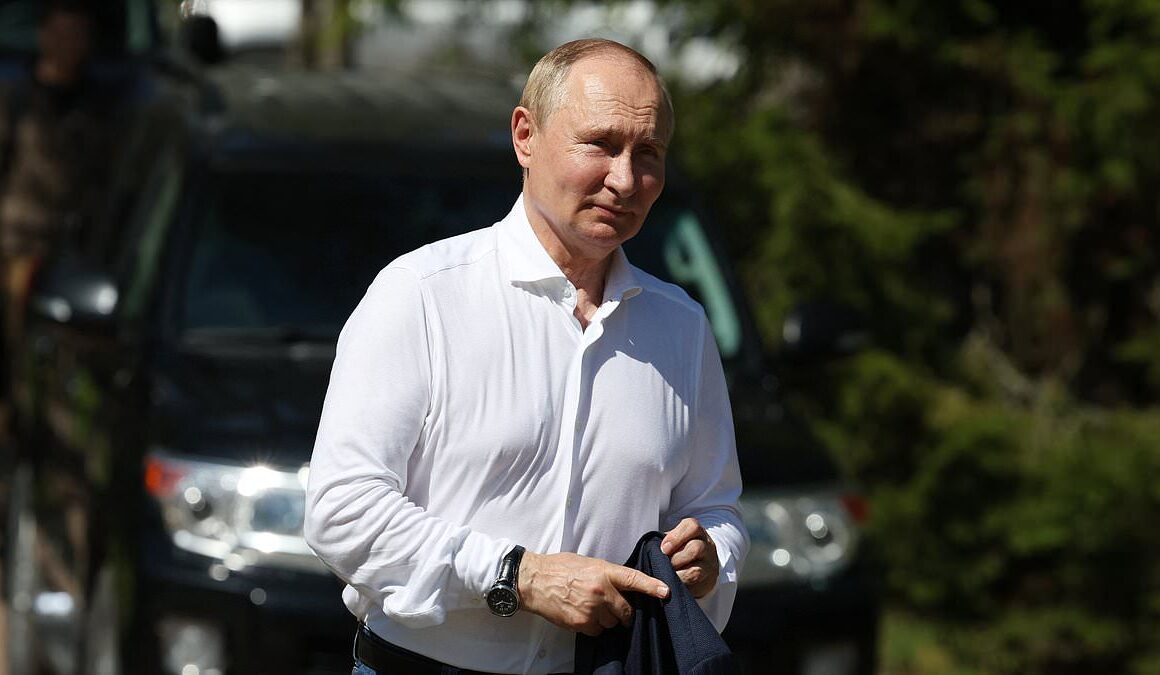Questions have been raised over the possible involvement of Russia in a series of coordinated attacks against France‘s high-speed rail network.
The attacks were launched last night – with fires started at key installations just hours before the opening ceremony of the Paris 2024 Olympics – bringing major disruption to some of the country’s busiest rail lines.
While it is currently unclear who was responsible for the attacks, the threat posed by Russia against European trains has been well documented.
Speaking in April, the Czech Republic’s transport minister told the Financial Times that Russia has made ‘thousands’ of attempts against rail networks across the continent in an attempt to destabilise the EU and sabotage critical infrastructure.
Adding to the suspicion, an alleged Russian spy was arrested earlier this week and charged with working ‘with a foreign power to try and incite hostilities in France’ after being identified as working for the FSB, Vladimir Putin‘s intelligence agency.

Questions have been raised over the possible involvement of Russia in a series of coordinated attacks against France’s high-speed rail network. Pictured: Russian President Vladimir Putin is pictured today during a meeting with the Belarusian President in northern Russia

SNCF employees and French gendarmes inspect the scene of a suspected attack on the high speed railway network at Croiselles, northern France on July 26, 2024
Last night, with just hours to go before the opening ceremony on the River Seine, fires were started at key installations, bringing trains to a halt and affecting around 800,000 passengers.
The Eurostar is advising passengers not to travel today after its rail services between London and Paris were disrupted by the acts of vandalism, the BBC has reported, with several trains cancelled and others diverted.
While no claim of responsibility has been made and French authorities are yet to name suspects, there is a clear correlation between the targeted attacks and the Olympics getting underway today.
It also comes just three months after the Czech warning, saying that Russia has been working to disrupt railway networks across Europe.
The Czech rail warning was issued against the backdrop of Vladimir Putin’s on-going invasion of Ukraine – launched in February 2022 and which continues to this day – which has seen Ukraine’s European allies supporting Kyiv with arms to help bolster its war effort.
Martin Kupka told the British publication at the time that Moscow was suspected of having made ‘thousands of attempts to weaken our systems’ since Putin launched the invasion.
These attacks came in the form of a hacking campaign, he said, and included the targeting on signalling systems and the network of the Czech national railway operator České dráhy.
He also said that attacks had taken ticketing systems offline, and raised concerns that interference in signalling could lead to serious railway accidents.
However, he also said that – so far – the Czech Republic had been able to defend itself against such attack.,
‘It’s definitely a difficult point . . .[but] I’m really very satisfied because we are able to defend all systems before a successful attack,’ he told the FT.
Kupka’s comments were not the first warning, however.
In March 2023, the EU’s Agency for Cybersecurity published a report that said there have been ‘attacks against railway companies with an increasing rate, primarily due to Russia’s invasion of Ukraine’.
Major attacks had been carried out on railway companies in Latvia, Lithuania, Romania and Estonia, the report said at the time.
The Czech Republic’s cyber agency NUKIB had also previously warned of the rising number of cyber-attacks, saying in a July 2023 repot: ‘One of the last year’s prominent trends has been the growing interest of malicious attackers in the energy and transportation sectors.’
České dráhy also said it had seen an increase in such attacks.
Suspicion of Russian involvement in the attacks in France is only bolstered by the fact that an alleged Russian spy was arrested earlier this week.
Kirill Gryaznov, 40, was arrested on Wednesday and charged with working ‘with a foreign power to try and incite hostilities in France’ after being identified as working for the FSB, Vladimir Putin’s domestic intelligence agency.

The attacks on the French rail network come after a 40-year-old man was charged with working ‘with a foreign power to try and incite hostilities in France’ earlier this week. Kirill Gryaznov who denies any wrongdoing – has been identified as working for the FSB, Russia ‘s Federal Security Service domestic intelligence agency
Gryaznov – who denies any wrongdoing – is said to have boasted about turning the start of the Paris Olympics into ‘an opening ceremony like no other’.
What’s more, Russia has a motive.
Russia is officially barred from the Games due to its war in Ukraine, although just over a dozen athletes from the country are being allowed to compete as neutrals.
Athletes from the country were also banned from the Olympics and global sports for four years over the Russian doping scandal. Moscow has long claimed its athletes were unfairly targeted.
Alex Kokcharov, Russia analyst at S&P Global Market Intelligence, told MailOnline: ‘Russia has both the intent and capability to attempt sabotage acts in Europe, especially in France. Russian intent is largely linked to the fact that Russia was not invited to the Olympic games’.
Kokcharov pointed to the arrest of a suspected IED plotter, a Russian-Ukrainian man, on June 3 near Paris’s Charles de Gaulle airport as revealing ‘possible tactics of Russian state-directed terrorism risks’ on the continent.
He also highlighted an incident which saw three men – a Bulgarian, a Ukrainian and a German national — arrested over alleged links to an incident in which five coffins marked ‘French soldiers in Ukraine’ were left near the Eiffel Tower.
Writing in June, he said: ‘The arrest of a suspected Russian improvised explosive device (IED) plotter in France confirms high risks of Russian state-directed attacks in Europe in the coming months, especially during major international events such as sporting events, elections or political summits.’
France’s former ambassador to Moscow, Jean de Gliniasty, said Russia could well be behind the latest sabotage in Paris ahead of the start of the Olympics today.
‘We are obviously in a situation of conflict with Russia, and Russia is onviously not going to do anything, and that is an understatement, to help these Olympic Games be a success,’ he told LCI.
‘And so we’re going to come up against a lot of difficulties of this kind, either direct or indirect.’ He added that the involvement of far-left radicals could not be ruled out either, suggesting that protests in the country have ‘got out of hand’ in recent years.
Meanwhile Petter Nesser, an expert on terrorism in Europe, told Vox that while it can be difficult to attribute interference to Moscow directly, it is clear that ‘Russia wants to sow discord and weaken cooperation among European states to help them have their way in Ukraine.
‘They have shown in the past they can use their spy networks and proxies to sow discord,’ he added.
It would not be the first time in modern history Russia has carried out attack on European soil, either (notwithstanding the war in Ukraine).
The Czech Republic blamed Russia for causing a series of unexplained explosions at an ammunition depot in 2014, with evidence coming to light in 2021.
The Kremlin’s agents were also behind the 2018 Salisbury poisonings, in which a former Russian spy – Sergei Skripal – and his daughter Yulia were targeted with the Novichok nerve agent.
While the Skripals survived, the nerve agent led to the death of British woman Dawn Sturgess who found it in a perfume bottle.
In 2019, Zelimkhan Khangoshvili – a Chechen platoon commander considered a terrorist by the Russian government – was assassinated in Berlin by by FSB operative Vadim Krasikov.

Passengers inside Gare de Bordeaux Saint-Jean station after threats against France’s high-speed TGV network, ahead of the Paris 2024 Olympics opening ceremony

Passengers queue at the Eurostar terminal at St Pancras station in central London

French President Emmanuel Macron is pictured this morning at the Elysee palace in Paris
Meanwhile, French transport minister Patrice Vergriete condemned the ‘malicious acts’ that have severely disrupted travel across the country.
High-speed trains including Eurostar were hit by what the national rail company SNCF called a series of co-ordinated arson attacks, although there was no immediate evidence of a link to the Games.
SNCF said its Atlantic, North and East networks were damaged in the incidents, but that an attempted attack in the South-East was foiled.
Vergriete wrote in a post on X: ‘Co-ordinated malicious acts targeted several TGV lines last night and will seriously disrupt traffic until this weekend.
‘I strongly condemn these criminal actions which will compromise the departures on vacation of many French people. A big thank you to the £SNCF teams, on deck to restore traffic conditions as quickly as possible.’
Trains from London to Paris and Lille were being delayed by around an hour and a half, and several trains have been cancelled.
Eurostar said all high-speed trains to and from Paris were being diverted to a slower line.
Security has been high in Paris in the build-up to the historic opening ceremony, in which athletes will travel down the River Seine on a flotilla of boats.
The majority of Team GB athletes are arriving at the Games via Eurostar.
However the British Olympic Association confirmed that only two athletes were scheduled to arrive on Friday, and had been subject to only minor delays.








